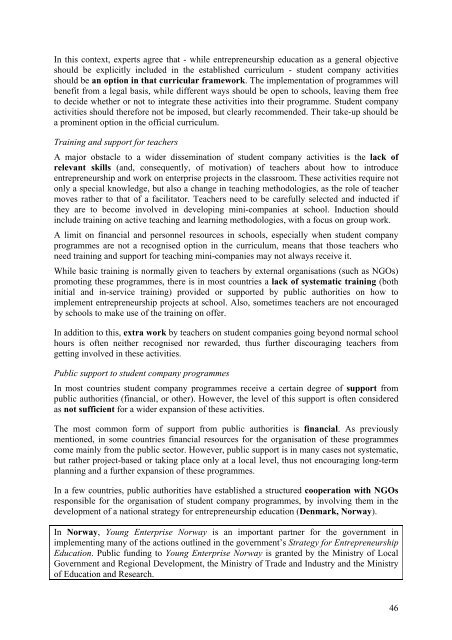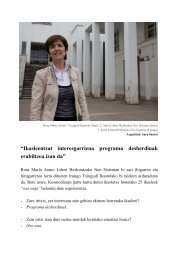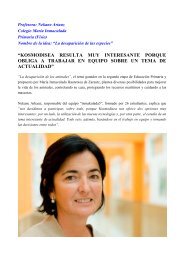Final Report of the Expert Group - European Commission - Europa
Final Report of the Expert Group - European Commission - Europa
Final Report of the Expert Group - European Commission - Europa
You also want an ePaper? Increase the reach of your titles
YUMPU automatically turns print PDFs into web optimized ePapers that Google loves.
In this context, experts agree that - while entrepreneurship education as a general objectiveshould be explicitly included in <strong>the</strong> established curriculum - student company activitiesshould be an option in that curricular framework. The implementation <strong>of</strong> programmes willbenefit from a legal basis, while different ways should be open to schools, leaving <strong>the</strong>m freeto decide whe<strong>the</strong>r or not to integrate <strong>the</strong>se activities into <strong>the</strong>ir programme. Student companyactivities should <strong>the</strong>refore not be imposed, but clearly recommended. Their take-up should bea prominent option in <strong>the</strong> <strong>of</strong>ficial curriculum.Training and support for teachersA major obstacle to a wider dissemination <strong>of</strong> student company activities is <strong>the</strong> lack <strong>of</strong>relevant skills (and, consequently, <strong>of</strong> motivation) <strong>of</strong> teachers about how to introduceentrepreneurship and work on enterprise projects in <strong>the</strong> classroom. These activities require notonly a special knowledge, but also a change in teaching methodologies, as <strong>the</strong> role <strong>of</strong> teachermoves ra<strong>the</strong>r to that <strong>of</strong> a facilitator. Teachers need to be carefully selected and inducted if<strong>the</strong>y are to become involved in developing mini-companies at school. Induction shouldinclude training on active teaching and learning methodologies, with a focus on group work.A limit on financial and personnel resources in schools, especially when student companyprogrammes are not a recognised option in <strong>the</strong> curriculum, means that those teachers whoneed training and support for teaching mini-companies may not always receive it.While basic training is normally given to teachers by external organisations (such as NGOs)promoting <strong>the</strong>se programmes, <strong>the</strong>re is in most countries a lack <strong>of</strong> systematic training (bothinitial and in-service training) provided or supported by public authorities on how toimplement entrepreneurship projects at school. Also, sometimes teachers are not encouragedby schools to make use <strong>of</strong> <strong>the</strong> training on <strong>of</strong>fer.In addition to this, extra work by teachers on student companies going beyond normal schoolhours is <strong>of</strong>ten nei<strong>the</strong>r recognised nor rewarded, thus fur<strong>the</strong>r discouraging teachers fromgetting involved in <strong>the</strong>se activities.Public support to student company programmesIn most countries student company programmes receive a certain degree <strong>of</strong> support frompublic authorities (financial, or o<strong>the</strong>r). However, <strong>the</strong> level <strong>of</strong> this support is <strong>of</strong>ten consideredas not sufficient for a wider expansion <strong>of</strong> <strong>the</strong>se activities.The most common form <strong>of</strong> support from public authorities is financial. As previouslymentioned, in some countries financial resources for <strong>the</strong> organisation <strong>of</strong> <strong>the</strong>se programmescome mainly from <strong>the</strong> public sector. However, public support is in many cases not systematic,but ra<strong>the</strong>r project-based or taking place only at a local level, thus not encouraging long-termplanning and a fur<strong>the</strong>r expansion <strong>of</strong> <strong>the</strong>se programmes.In a few countries, public authorities have established a structured cooperation with NGOsresponsible for <strong>the</strong> organisation <strong>of</strong> student company programmes, by involving <strong>the</strong>m in <strong>the</strong>development <strong>of</strong> a national strategy for entrepreneurship education (Denmark, Norway).In Norway, Young Enterprise Norway is an important partner for <strong>the</strong> government inimplementing many <strong>of</strong> <strong>the</strong> actions outlined in <strong>the</strong> government’s Strategy for EntrepreneurshipEducation. Public funding to Young Enterprise Norway is granted by <strong>the</strong> Ministry <strong>of</strong> LocalGovernment and Regional Development, <strong>the</strong> Ministry <strong>of</strong> Trade and Industry and <strong>the</strong> Ministry<strong>of</strong> Education and Research.46




